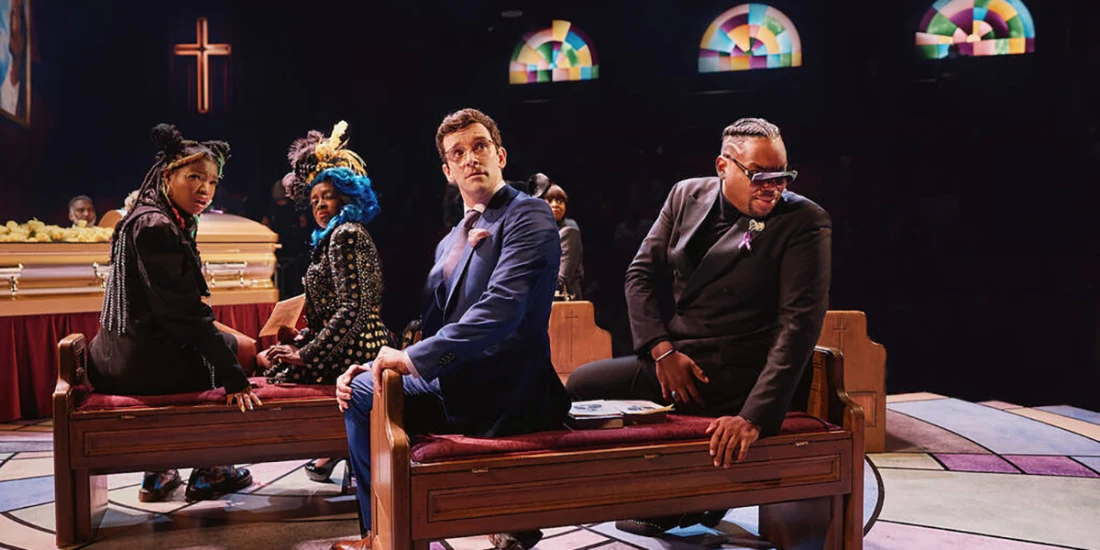‘Chicken & Biscuits’ review – a funny, familial feast of a show
All families have their secrets, but few handle them as entertainingly as the Mabry family in Douglas Lyon's Chicken & Biscuits. The crew have ostensibly gathered at Circle in the Square Theatre on Broadway to send off their beloved patriarch. Despite that dour premise, over the course of this life-affirming play, they rehash old beefs and put to rest long-simmering prejudices.
Confronting differences in response to death is nothing new in theatre. Refreshingly, in this laughter-rich script, and under Zhailon Levington's sparkling direction, the experience eschews the pitfalls of typical media portrayals of Black tragedy in favor of Black joy. For many traditional Broadway audience members, this play will be the first time that they observe the wit and merriment that Black-American families have long used to counteract grief.
Though there is much that is serious onstage in this two-hour-long comedy, Lyons has wisely embraced the authentic Black tradition of call-and-response humor to detangle the pain. And rather than take the longheld maxim that comedy must be "louder-faster-funnier," Levingston ― who at the age of 27 is the youngest Black director in Broadway history ― unfurls the story at a relaxed and multi-rhythmic pace.
At the top of the show, we are introduced to a frazzled Black mother Baneatta (Cleo King) preparing for her father's funeral as her pastor-husband Reginald (Norm Lewis) attempts to calm her nerves. The action jumps to a ne'er do well, single mother Beverly (Ebony Marshall-Oliver) seeking assurance from her teenage daughter La'Trice (Aigner Mizzelle) that her church outfit is sexy. Meanwhile, the bonny grandson of the family Kenny (Devere Rogers) assures his white boyfriend Logan (Michael Urie) that he will not be ostracized this time around. The oldest granddaughter of the family (Alana Raquel Bowers) rounds out the action with the same withering gaze as her judgmental mother.
What brings this family together also traumatizes them: oppressive church values that stifle who they are. We see this, most hilariously, as Baneatta exhorts Beverly to cover her titties up with the same relish that she deploys to dismiss the existence of the Kenny-Logan relationship. As in real life, that disapproval against anything out-of-the-box evaporates as soon as the Baptist sermon begins. In Lewis's performance, ripped from many a Black-scripture-readings, we see that even the most-reserved prudes let their hair down to dance when it's time to celebrate their god.
As the proxy for unfamiliar audience members, Urie works every delectable angle of his Jewish "what-am-I-doing-here?" cipher as Logan to gut-busting effect. Rather than look down on Black life with these moments, Lyons and Levingston use them to lovingly comment on the over-the-top theatricality of the Black church. Lewis, as Reginald, and his amazing colleagues playfully dance back and forth between Biblical points before shimmying into the audience with gospel riffs, but without fear of reproval. So why can't they acknowledge the love of their gay son with that same openness? Or embrace that their departed loved one was a philanderer?
Kenny reveals he didn't fall in love with a white man because he rejects Black men, but because Logan was the first man to lovingly insist that he push through the closet to celebrate who he is, without shame. Similarly, Marshall-Oliver as Beverly pierces Baneatta's stiff veneer as her congregation's first lady by showing her how to release her pains with a series of breaths and repeated hallelujahs.
Initially, Baneatta is hesitant, but after observing her sister's cycle through the gestures ― in what Levingston has knowingly constructed to approximate the release of an African dance's contract and release ― she joins and breaks through the wall that has held her back for so long.
All is not perfect by the play's end, but as the family digs into their meal of chicken and biscuits, audiences are reminded that trauma does not have to define how we move through the world ― rather, we see that it is an invitation to work through our differences between the people we love most. It's the perfect take home message as we continue to navigate the viral pandemics that are tearing our nation apart.
Originally published on
